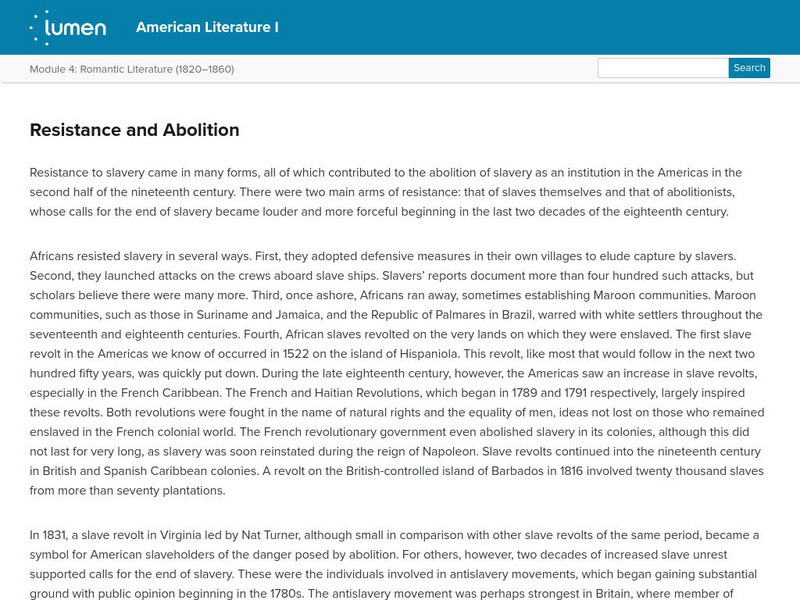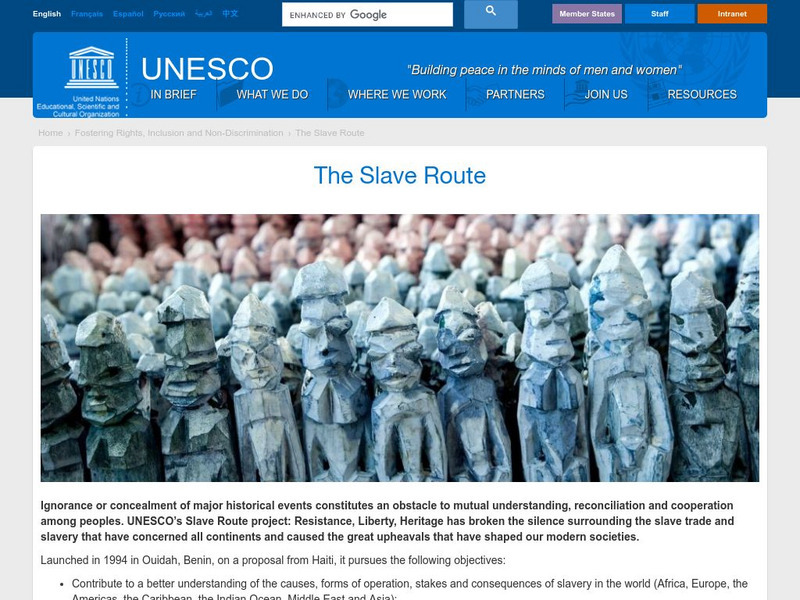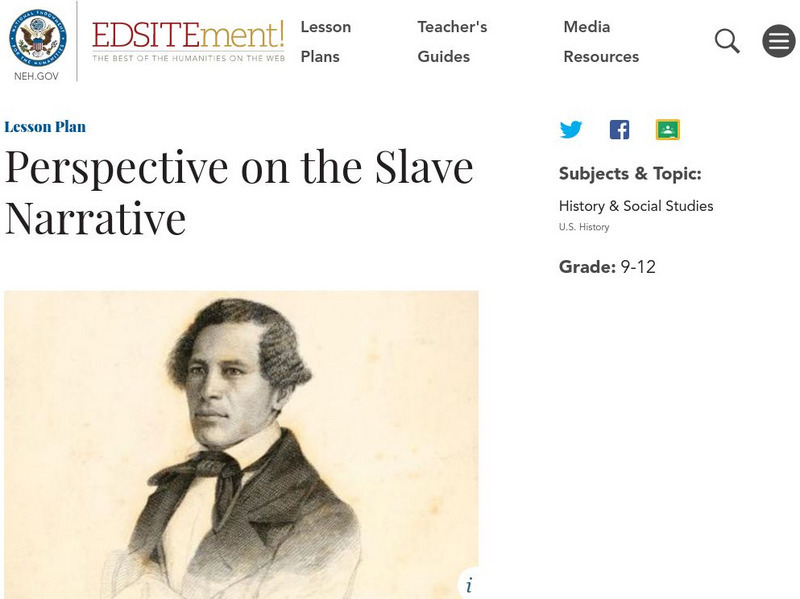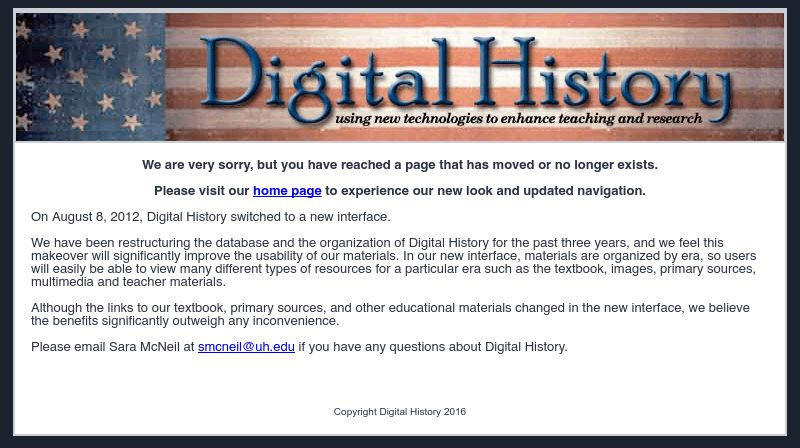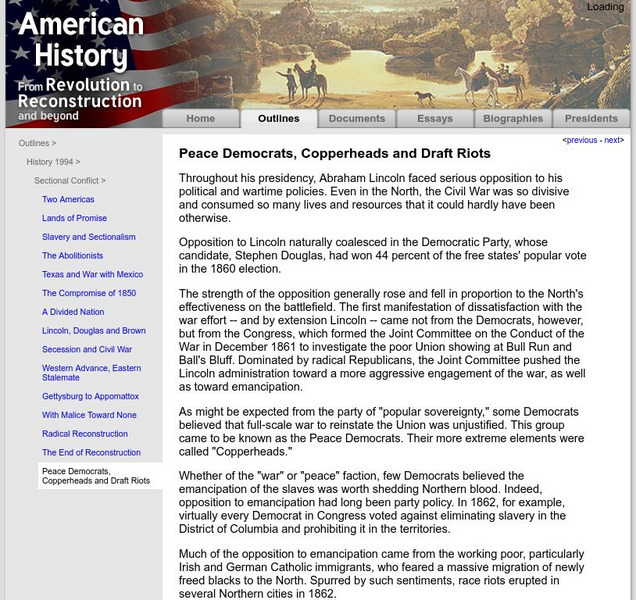Hi, what do you want to do?
Curated OER
The Underground Railroad
Students write about the impact of the Underground Railroad. In this slavery instructional activity, students examine primary documents as they conduct independent research to explore the role of the Underground Railroad during the fight...
Curated OER
Looking at Human Struggle Through The Language Arts Curriculum: The Faces of Slavery
Sixth graders examine the use of slavery in the United States. Using a map, they draw the route of the Tecora and Amistad voyages. Individually, they write an essay describing their opinions on whether the Africans on the ships should be...
Curated OER
Abolishing Slavery
Students explain the goals and methods of the abolitionist movement.
They identify key leaders in the movement. This instructional activity has adaptations for elementary through high school. Links are provided for resource readings.
Curated OER
A New Birth of Freedom: Black Soldiers in the Union Army
Students use primary documents to analyze the events surrounding black soldiers joining the Union Army. In this content area reading lesson, students view multiple primary documents, analyzing and answering questions about them.
Curated OER
A Durable Memento: Portraits by Augustus Washington
Learners read primary source newspaper articles from mid 19th century United States. The topics of the articles are slavery, abolitionism and colonization. Students are given several options for activities based on the readings.
Curated OER
The Anti-Slavery Movement
Eleventh graders as a class create and write a constitution for an anti-slavery society. They investigate demographics of slavery, treatment of slaves, the colonization movement, and women in the abolition movement, and present their...
Curated OER
White Southerners' Defense of Slaveholding
Pupils read transcriptions of articles from two historical Virginian newspapers and examine how white southerners defended the institution of slavery. They write a one-act play or a dialogue between an abolitionist and a slaveholder.
Curated OER
Social Studies: Underground Railroad
Students role-play as escaped slaves making their way from North Carolina to Canada, stopping in Indiana. They track their journeys on maps and include a stop at Harriet Tubman's. Students write three paragraphs about how Tubman aids...
Curated OER
Knowledge is Power
Students explore the distinct forms of knowledge that enslaved Africans brought with them to America or developed while enslaved. They study how political movements of the 18th century helped develop abolitionist thinking.
Curated OER
A New Birth of Freedom: Black Soldiers in the Union Army
Young scholars investigate the history of civil rights by viewing historical photographs. In this U.S. history lesson, students discuss why Black Soldiers fought for their rights by joining the Union Army in the 1800's. Young...
Curated OER
Frederick Douglass: This is Your Life; The Abolitionist
Seventh graders study the abolitionist movement in antebellum America.
Curated OER
Clay, Calhoun & Webster
In this United States history worksheet, students utilize a word bank of 10 terms or phrases to answer 10 fill in the blank questions pertaining to Regionalism. A short answer question is included as well.
Curated OER
The Great Debate Lesson Plan: Slavery in the U.S. Constitution
Students examine the U.S. Constitution to see what has been writte about slavery. Then, students, in groups, research the Constitutional Convention of 1787 to explore slavery compromises.
Curated OER
Lesson Plan: The 1856 Election
Students identify the key issue in the election of 1856, they also identify some of the key people invovled in the election. Students discuss the role of propaganda in politics. Also, students discuss the significance of the election of...
Lumen Learning
Lumen: American Literature: Resistance and Abolition
This article focuses on the resistance and abolition of slavery in the United States. It discusses the ways in which the slaves resisted slavery and the role abolitionists played.
Choices Program, Brown University
Choices: A Forgotten History: The Slave Trade and Slavery in New England
Unit explores, through a series of videos from notable scholars, the effects of the trade in slaves and of slavery itself on the new Americans of the time and helps students to understand how history, and the telling of history, affects...
Other
Abolitionists, Free Blacks, and Runaway Slaves: Surviving Slavery in Maryland
Read about the groups of people who lived on the Eastern Shore of Maryland in the mid-1800s and fought against slavery: the Quakers, former slaves, and fugitive slaves. This article describes the efforts of both whites and blacks, who...
United Nations
Unesco: The Slave Route
An excellent set of resources on slavery and the slave trade. Looks at artists' perceptions, interviews with historians and others, the Transatlantic Slave Trade, trade in the Indian Ocean, resistance and abolition, trade in the...
Understanding Slavery Initiative
Understanding Slavery: The Campaign for Abolition: Campaigning Against Slavery
Find out about the first mass human rights movement in history when African monarchs, enslaved Africans, freed slaves, and millions of other ordinary people campaigned against the slave trade and fought for the abolition of slavery.
National Endowment for the Humanities
Neh: Edsit Ement: Perspective on the Slave Narrative
A lesson plan focusing on the the historical context of slave narratives, "Perspective on the Slave Narrative" introduces students to the abolitionist movement and the slave experience.
Other
Parliamentary Archives: Parliament and the British Slave Trade
This is an extensive resource dealing with the British Slave Trade from 1600 until it was abolished in 1807. A comprehensive timeline links to additional, supplementary, resources.
Digital History
Digital History: Radical Reform and Antislavery
Find a comprehensive history of the anti-slavery movement and how it fit into the larger reform movements of the first half of the 19th century.
University of Groningen
American History: Outlines: Peace Democrats, Copperheads, and Draft Riots
Abraham Lincoln did not have universal backing in the conduct of the Civil War. Read about the opposition, mainly from the Democrats, who opposed emancipation of the slaves and waging a war to reunited the country.
British Library
British Library: Discovering Literature: Abolition of the Slave Trade and Slavery in Britain
Towards the end of the 18th century, a movement emerged calling for an end to the slave trade and, later, slavery itself. This article traces the road to abolition from the 1780s to the 1830s, highlighting the impacts of grass-root...



















